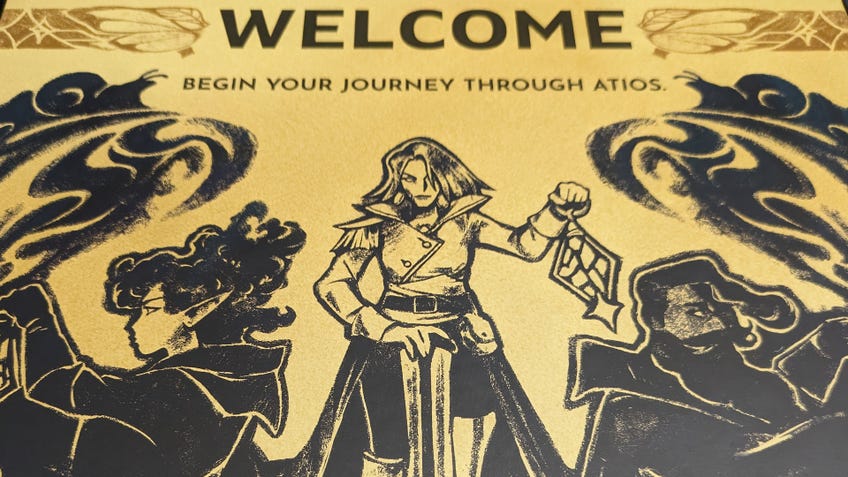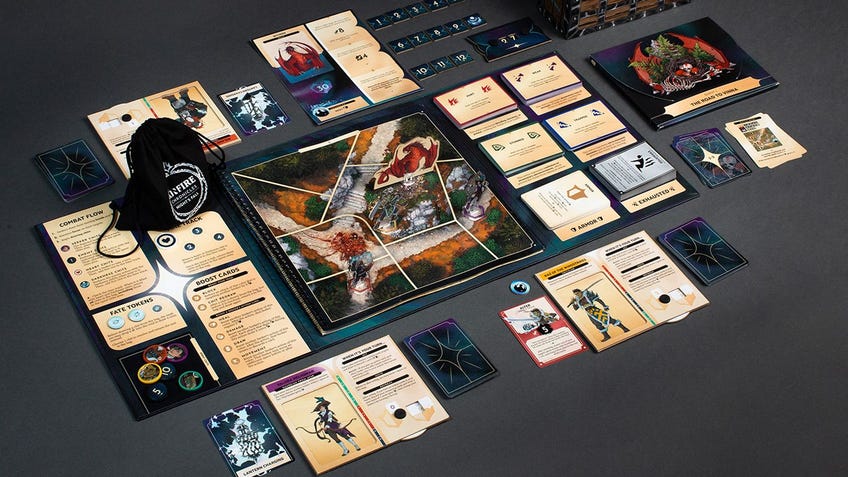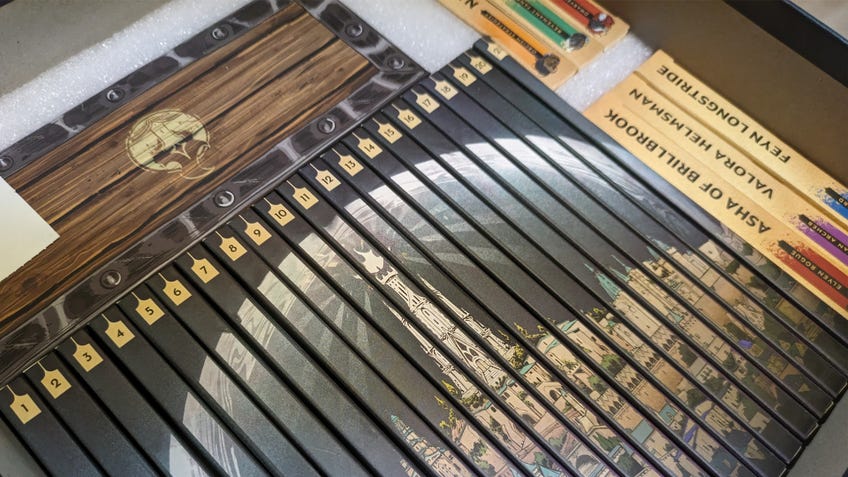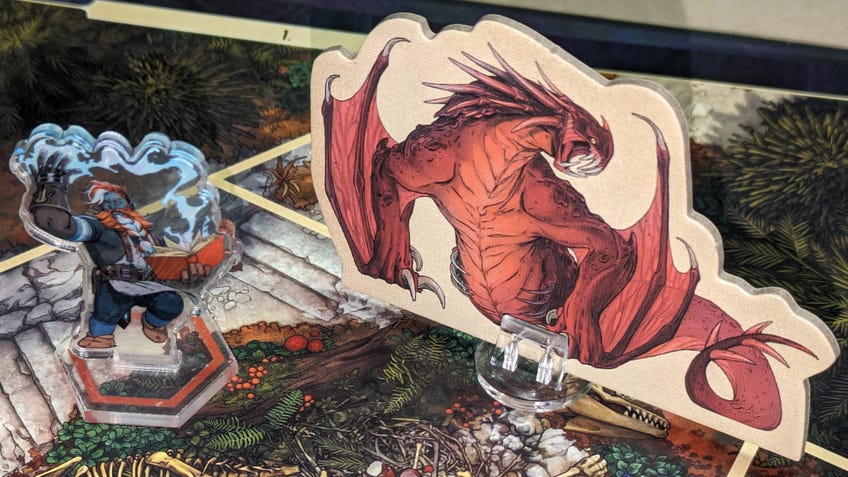In bettering Descent's Terrinoth with its vibrant world, Kinfire Chronicles has become the fantasy board game to watch
Hot property.
In 2005, designer Kevin Wilson’s Descent: Journeys in the Dark emerged with profound effect. It would become influential for a generation of dungeon-crawler board games that would later explode with the advent of crowdfunding, led by the likes of Gloomhaven. More importantly, it served as a flagship entry for Fantasy Flight Games, helping to establish the studio’s in-house fantasy universe of Terrinoth, the backbone of classics such as Runebound, Battlelore and dozens of others. Almost a decade later, Wilson is back, teaming up with fledgling publisher Incredible Dream Studios to craft an altogether new fantasy board game that is thrilling and fresh. It also happens to be the launching point for a series of titles that will share a setting. Kinfire is the new Terrinoth, and it’s far more vibrant than its predecessor.
Kinfire Chronicles: Night’s Fall is the launching point for this new world. It’s a big-box adventure that has players inhabiting the role of Seekers, working in unison as stewards of the city of Din’Lux to protect its people and defeat the horrors of the Starless Nights. This is a land plunged into utter darkness. Lighthouses of Kinfire illuminate the countryside, their spark carried in lanterns by the Seekers as a tool to repel the wicked. It’s a setting that feels immediately more fleshed out and rich than Terrinoth, a universe that was often accused of being too generic and bland. Here, there is an evocative threat, as well as exotic inhabitants with diverse cultures and identity. The towns are few but well detailed, and you get to interact with various elements and characters that are truly interesting. After a couple of hours of play, I felt I knew Kinfire better than a setting I’ve spent years adventuring in.
It helps that the game itself is banging. Structurally, Kinfire Chronicles is most similar to Kingdom Death: Monster. Players embark on a quest with some branching narrative elements, confront a monstrous foe and then return to town to lick their wounds and develop their characters. It’s a well-worn format that comprises a satisfying gameplay loop of conflict and reward, with the overall experience avoiding repetition by supplying boss fights that are varied and consistently intriguing.
The systems utilised are incredibly engaging for their complexity. Initiative order is determined by drawing tokens from a bag, creating a constant sense of unpredictability. Actions are carried out through a slick card system. Each player’s unique Seeker bears their own signature deck of abilities. There is significant asymmetry and even a satisfying element of deck-building through story rewards and loot. More significantly, Wilson furthers his experimentation with cooperation exhibited in his recent (and now sadly out-of-print) Teenage Mutant Turtles Adventures games from defunct publisher IDW. The card play in Kinfire Chronicles allows for allies to boost each other off-turn, presenting a more nuanced decision space to managing each hand of cards. The system on the whole is tight and well-constructed, but it’s not dry or too restrictive.
After a couple of hours of play, I felt I knew Kinfire better than a setting I’ve spent years adventuring in.
While I typically prefer cooperative games to be challenging, there is a sublime quality to Kinfire Chronicles that is uncharacteristically alluring. This is a relaxed game that doesn’t pound you into the earth or vivisect your heroes. You can’t shut off your brain entirely, but it’s not a grind and it’s never gruelling. It’s Kingdom Death: Monster if settlements had couches and an open bar. And let me tell you: a chill boss-battler is surprisingly comforting, particularly when the story surrounding it is engaging enough to keep you hooked.
This perspective fits well with the overall tone. It’s a beautiful game with illustrations that are not-quite-cartoony, but retain an element of fantastical mirth. The product is gorgeous with an extreme attention to detail. This feels like it was produced from a long-established publisher, not an upstart company.

While Kinfire Chronicles: Night’s Fall is a complete experience, its reach extends beyond that large box. It’s immediately clear that part of this game’s purpose is to establish the Kinfire world with a bang. In the wake of this giant has emerged the more diminutive Kinfire Delve series, a small-box line of games sharing a system that facilitates a more challenging fantasy adventure with a tight footprint of cards. What’s most shocking is just how great this little bugger is.
Kinfire Chronicles is Kingdom Death: Monster if settlements had couches and an open bar.
Each Delve box comes with two characters. With just one set you can play solo or cooperative with a partner. Combine two boxes and you can play with up to three others. Each player takes on the role of a character from Kinfire Chronicles. Again, they possess a unique deck and playstyle. You wield these formidable champions to confront challenges and obstacles in a dungeon, working your way through a deck and ultimately confronting the primary foe.
Much like its larger sibling, the card play here is the killer feature. As before, you can play cards off turn to boost allies, creating a large emphasis on teamwork. Here, however, the game is about carefully managing your hand as it represents your character’s stamina. Refreshing your options comes at a cost, and can often increase the momentum of the antagonists working against you.

It’s a delightful experience, suffering only from repetition after exhausting the content across a dozen or so plays - but even then, it sparks again after a bit of a break. If you combine multiple Delve boxes and have varied settings and characters to explore, its life is extended significantly.
I’m not sure if the series will maintain its wonder and enrichment, but what’s been accomplished so far is very promising.
What really fascinates me about this small-box approach is how it functions as a companion piece to Kinfire Chronicles. You needn’t play both games but, for those that can manage it, each will inform the other as an expansion of setting and presence. I view Kinfire Delve like a coffee-table book: something to peruse in your downtime and increase appreciation for the Kinfire property. It’s another way to experience these characters and develop their personalities. It’s fascinating that this is accomplished with a thoughtful 45-minute adventure card game.
Chronicles and Delve are just the beginning. Kinfire Council is due to arrive on Kickstarter at the end of next month. Just like the previous two titles, this is another Kevin Wilson design that will continue to detail and enrich the existing Kinfire setting. What’s noteworthy is that Wilson is once again exploring alternative design approaches; this new entry will be a competitive worker-placement game. In addition to standard workers, players will be able to send Seekers out to perform various tasks in the central city of Din’Lux, a key location in Night’s End. There’s a creative essence here that’s harnessed to expand this property and continue to develop its personality and quirks. I’m not sure if the series will maintain its wonder and enrichment, but what’s been accomplished so far is very promising.

There has been one concerning development with this line that’s partially clouded its future, however. In what seems to be a new trend among publishers on crowdfunding platforms, Incredible Dream has initiated a program that offers a bonus card pack as a reward for placing a $1 pre-order towards backing the upcoming campaign. Essentially, it’s a pre-order to a pre-order, and it’s caused a stir in online communities.
“We knew this was risky and we debated it as a team for quite some time,” the studio’s CEO Jane Hoffacker tells me over email. “I believe this promotion is a win-win for our fans and our company. For a $1 early deposit, we're sending early previews and content to help you decide if you're going to like this game and to give us feedback that will help us pull it together. If you're onboard, you'll also get an awesome micro-expansion kit for all five of our games with your pledge.”
There is a vision here with breadth that extends beyond the multitude of other big-box crowdfunded adventure games.
Cynically, one could theorise that this will hook backers with a trivial entry price and then leverage sunk-cost fallacy to achieve a high conversion rate. I ask Hoffacker what their primary benefit is from this pre-order system.
“We are running this preorder system on our own ecommerce store and tools, building the muscles to create more engaging content for our fans,” she says. “The better we can understand our audience, the better we can serve them. And we'll save a bit of money from not having to pay fees and commissions to third-party pre-launch services. This is money that we can reinvest more into making better products and keeping our customers happy. As a small studio that is building its own community from the ground up, every little bit helps.”
From the consumer perspective, one of the downsides of crowdfunding is that you are more exposed to the marketing and commercial aspects of the hobby. This pre-launch noise is worrisome and a distraction to the potential of the Kinfire series.
It seems as though Kinfire is at an inflection point. There is a vision here with breadth that extends beyond the multitude of other big-box crowdfunded adventure games. This new property has found a great deal of success by launching on the back of one of 2023’s best board games, but for it truly to reach the scope and surpass the success of Terrinoth, it needs to maintain momentum and continue to deliver quality tabletop titles. With the consistency and strength of the series thus far, I wouldn’t bet against it.


